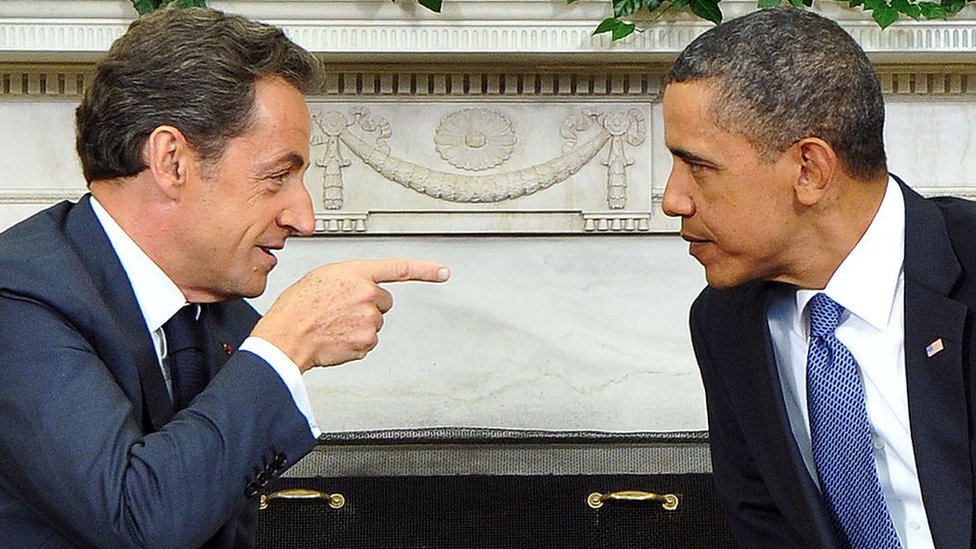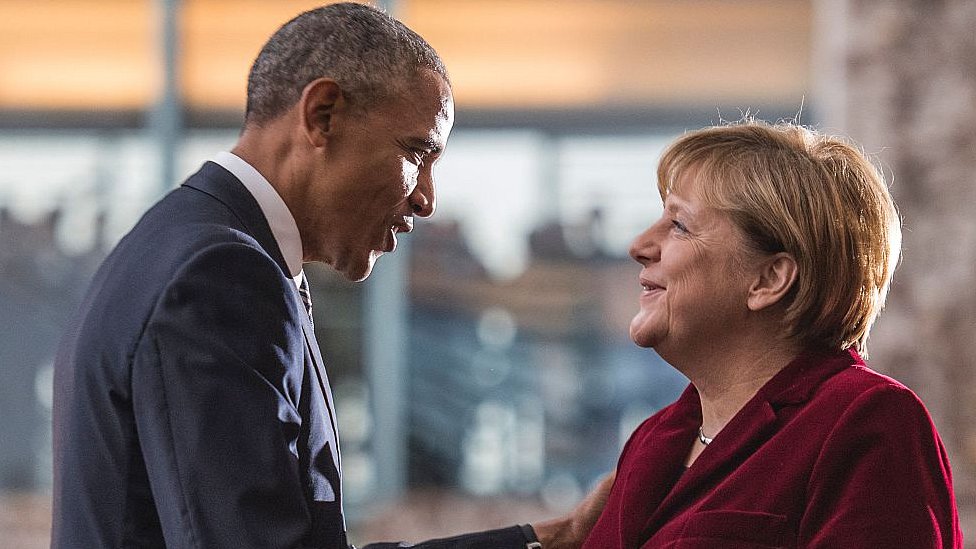November 20 (BBC) – Former US President Barack Obama likens Russia’s Vladimir Putin to a tough Chicago “ward boss” and describes former French President Nicolas Sarkozy as being full of “overblown rhetoric” in the first volume of his two-part memoir.
A Promised Land sold nearly 890,000 copies in the US and Canada in its first 24 hours – a record for publisher Penguin Random House. It is expected to become by far the biggest-selling presidential memoir in history.
In the book, Mr Obama recalls his travels around the world as the 44th US president and his meetings with world leaders. So who made a good impression and who didn’t?
David Cameron
The Eton-educated conservative who served as UK prime minister from 2010-2016 was “urbane and confident” and had “the easy confidence of someone who’d never been pressed too hard by life”.
Mr Obama said he warmed to him as a person (“I liked him personally, even when we butted heads”) but made no secret of the fact that he disagreed with his economic policies. “Cameron hewed closely to free-market orthodoxy, having promised voters that his platform of deficit reduction and cuts to government services – along with regulatory reform and expanded trade – would usher in a new era of British competitiveness,” he wrote. “Instead, predictably, the British economy would fall deeper into a recession.”
Vladimir Putin
Mr Obama said the Russian leader reminded him of the political barons he encountered during his early career in Chicago. He writes he was “like a ward [district] boss, except with nukes and a UN Security Council veto”.
He continues: “Putin did, in fact, remind me of the sorts of men who had once run the Chicago machine or Tammany Hall [a New York City political organisation] – tough, street-smart, unsentimental characters who knew what they knew, who never moved outside their narrow experiences, and who viewed patronage, bribery, shakedowns, fraud, and occasional violence as legitimate tools of the trade.”

Nicolas Sarkozy
The former French resident was all emotional outbursts and overblown rhetoric” and like “a figure out of a Toulouse-Lautrec painting”, according to Mr Obama.
“Conversations with Sarkozy were by turns amusing and exasperating, his hands in perpetual motion, his chest thrust out like a bantam cock’s, his personal translator… always beside him to frantically mirror his every gesture and intonation as the conversation swooped from flattery to bluster to genuine insight, never straying from his primary, barely disguised interest, which was to be at the centre of the action and take credit for whatever it was that might be worth taking credit for.”

Angela Merkel
The German leader is referred to as “steady, honest, intellectually rigorous, and instinctually kind”. Mr Obama notes that she had, at first, been sceptical of him, because of his lofty rhetoric and speech-making skills. “I took no offence, figuring that as a German leader, an aversion to possible demagoguery was probably a healthy thing.”

Recep Tayyip Erdogan
Mr Obama found the Turkish leader to be “cordial and generally responsive to my requests”.
“But whenever I listened to him speak, his tall frame slightly stooped, his voice a forceful staccato that rose an octave in response to various grievances or perceived slights. I got the strong impression that his commitment to democracy and the rule of law might last only as long as it preserved his own power.”
Manmohan Singh
The former Indian prime minister is described as having been “wise, thoughtful, and scrupulously honest” and the “chief architect of India’s economic transformation”. Mr Singh was a “self-effacing technocrat who’d won the people’s trust not by appealing to their passions but bringing about higher living standards and maintaining a well-earned reputation for not being corrupt”, Mr Obama observes.
Václav Klaus
Mr Obama was an admirer of Václav Havel – the Czech Republic’s first president after the Velvet Revolution – but found his successor Václav Klaus more troubling. Mr Obama writes that he feared the Eurosceptic president signalled a rise of right-wing populism across Europe and embodied “how the economic crisis [of 2008-9] was causing an uptick in nationalism, anti-immigrant sentiment, and scepticism about [European] integration”. He added: “The hopeful tide of democratisation, liberalisation, and integration that had swept the globe after the end of the Cold War was beginning to recede.”































































